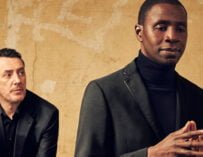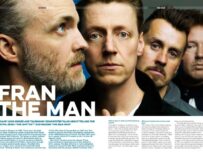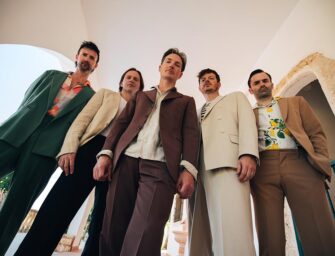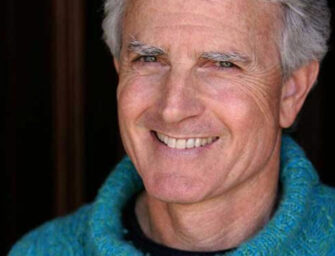
The velvet-voiced Lighthouse Family singer-songwriter talks about going it alone, learning to write music online and collaborating with other writers
 emember 1996? The year that Tupac Shakur was shot dead, Oasis were at their peak, The Spice Girls had just arrived, Jarvis Cocker humorously sabotaged Michael Jackson’s performance at the BRITs, and Lighthouse Family’s debut album Ocean Drive was practically everywhere. Spending over 150 weeks in the UK chart, it created hit singles of the title track and Lifted, which was a Top 10 single in its own right, and catapulted singer Tunde Baiyewu and his keyboard-playing songwriting partner Paul Tucker onto the unpredictable rollercoaster of the pop music world.
emember 1996? The year that Tupac Shakur was shot dead, Oasis were at their peak, The Spice Girls had just arrived, Jarvis Cocker humorously sabotaged Michael Jackson’s performance at the BRITs, and Lighthouse Family’s debut album Ocean Drive was practically everywhere. Spending over 150 weeks in the UK chart, it created hit singles of the title track and Lifted, which was a Top 10 single in its own right, and catapulted singer Tunde Baiyewu and his keyboard-playing songwriting partner Paul Tucker onto the unpredictable rollercoaster of the pop music world.Tunde was presented as the velvet-voiced Nigerian frontman of the outfit but, as we discover, wasn’t just the singer. He is in fact credited for co-writing a large proportion of their material right from the start, including Lifted. Although chart success arrived quickly and relatively easily, this proved to be just one section of Tunde’s songwriting career and since 2004 he has enjoyed continued success as a solo artist.
We find Tunde in the midst of promotion for his second solo long-player, Diamond In A Rock, which arrived earlier this year. As we’ll find, he’s learnt a lot from the Lighthouse Family experience, but also from traditional methods as well, and his musical roots go much further back…
What made you get into writing music? Was it when Lighthouse Family started?
“I’d go back beyond that, to when I was a kid. Back in Nigeria, my mother put me in the gospel choir, and there were times when you go to church on Sunday and sing some hymns that had pretty melodies that were nice to sing. But, I noticed after leaving church I was in a different state – I felt happy and elated. If there was something bothering me before I went to church, by the time I came out I was like a totally different person. It fascinated me that we were just looking at these songs, reading the words and singing certain melodies, and they have the ability to change the way we feel. As a kid I used to think about these songs – where did they come from? I thought they just existed! That was my rationale as a kid – I didn’t understand that people actually do write these songs. Then I thought ‘I wish I could do that’.”
How did the songwriting partnership with Paul Tucker start?
“When I met Paul, he had Ocean Drive already written and I remember hearing it and thinking ‘Wow, what an amazing song’, I loved it. By that stage I was half involved with music, because I’d lay down vocals on tracks for people who were studying music technology, and I was buying a lot of records, so I was absorbing a lot of stuff through osmosis, musically speaking. After we got our record deal and I’d sit down and be writing with Paul, one of the first things I noticed I had a knack for doing certain things melodically. It just came naturally. For instance, Lifted we co-wrote together and a lot of the melodies and backing vocals came from me. A lot of the time, I’d be in the studio with Paul, we’d sit there and talk, and get into a tirade of philosophical debate about life and survival, and what it all meant. He’d have the skill of structuring a lot of those conversations into lyrics. That was really how it started off – I’d do a lot of the melodic side and Paul did most of the lyrical stuff.”
What order did that generally happen?
“There was no fixed order. I bought myself a dictaphone and if any melodic fragment came into my head, I’d record and play it to Paul. Sometimes we might come up with a phrase from one of our long-winded conversations and something would come out of that, that we’d keep, then we’d work on the melodies. We’d both bring things to the table and that was basically how everything started to develop.
[cc_blockquote_right] I THINK WE HAD A CERTAIN NAIVETY AND CHARM THAT STRUCK A CHORD [/cc_blockquote_right]”In those early days, I realised very quickly that if I wanted to do this properly and gain a certain degree of control over what I was doing, it was important for me to learn an instrument. So I bought a guitar because I just thought it was very portable. So that was how – for me anyway – we started on the songwriting level.”
How did Lifted in particular come together?
“Back then we both had a very spiritual take on life – not in terms of going to church, because I’m actually not a Christian, but just in the way we viewed things – and I think a lot of that was reflected in our songs, like Lifted. In terms of the melody, the structure and the bulk of the lyrics, I’d say we had it done in about a week.”
When you got signed, did you already have an album’s worth of material?
“Yeah, quite a few songs of our songs never even made it onto the record. There was one called Honey Moon that I thought was beautiful song that never made it on. We were always writing and in the studio back then in Newcastle, so there was more than a handful of songs and half-complete ideas. The record company was aware of all these songs, but the good thing was they linked us up with other writers like Tim Kellett and Martin from the Kane Gang and Junior Giscombe. All these people were experienced songwriters and had hits, but I think we had a certain naïvety and charm that struck a chord with the record company and made us unique, so what they really did was develop the ideas we already had. They never tried to force any new ideas on us, or change what we were doing, but they really helped to make us to be what we eventually became.”
What happened to Lighthouse Family?
“By that point we’d made three or four albums as Lighthouse Family, and this always happens in bands, you develop your craft, you become good and touch wood you become successful. And then, I think anyone who’s been in a band will probably attest to this, sometimes things start becoming difficult, especially when there’s a lot of success in the band, and egos start getting a bit out of hand. So it got to the point when I just wanted to go an make a solo record by myself, because things were starting to get unruly”
So that was in 2004 when you brought out Tunde. Were you writing completely on your own then or still co-writing?
“I love collaborating with people. The beauty of it is that somebody will bring something to the table that you would never really thought of – a different way of looking at a certain idea, melodically or lyrically, so it’s always a good exercise, particularly when you have a lot of experience behind you in terms of songwriting. So that album, my first solo record, most of it I did by myself, but I also teamed up with Sebastian Rogers who also produced my new record. There were songs like I’ve Never Walked Alone that were done by me, but Sebastian helped shape them into a different sound.”
What did you learn from working with co-writers?
“When you’re young and naïve you think that songwriting means you have all these ideas, you chuck them into the pot, and out comes a song. But I realised after a number of years of doing things in all sorts of different ways, that the best and most coherent songs come out of just one idea. I actually went off and learnt a lot about songwriting, which I never really talked to people about – I did a lot online and learnt from Berklee College of Music. Even though I’d been writing songs for a while, I wanted a better understanding of what I was doing. One of the things I learnt was that songs usually come out of just one idea. It might be a simple phrase – one-bar, two-bars or whatever – but it’s the development of those ideas that creates a coherent thing called a song.”
[cc_blockquote_right] YOU LEARN ABOUT HOW SONGS WORK, BUT AT THE SAME TIME IT’S AS IF YOU’RE STARTING ALL OVER AGAIN [/cc_blockquote_right] So sort of things did you learn from online courses?“Over the years you can gradually learn these tools and techniques, and the more you practise them, the better you become. There’s no right or wrong way to write a song, but they’ll pick really great songs like Bob Dylan or Jimi Hendrix, and show how a particular developmental technique was used. Those were the same tools that Mozart and Beethoven used and those hymns I learnt as kid in church. When I go back now and look at them, I can see how the same techniques were applied to those songs, and how just one simple idea becomes the seed out of which a whole song grows. Those same principles can be applied lyrically, harmonically and melodically. It’s quite a fascinating subject actually! You learn all these things about how songs work, but at the same time it’s as if you’re starting all over again. It’s like you don’t know anything! Until something starts happening, then you know how to take control of it and steer it where you want it to go.”
Tell us about the last single Diamond In A Rock – that’s a great title.
“I remember talking with Ben Cullum [brother of Jamie] who I wrote this with, and the phrase ‘diamond in a rock’ just popped out of my mouth. He was like ‘Wow that’s great, that’s what we should use as a title’. For me it was an analogy for life – life can be hard like a rock, and when we come up against these difficult scenarios, we look upon it as a negative thing and we try to brush it aside. But when you think about it, these can be the best learning periods in our life when we’ve gained the most value. That’s what Diamond In A Rock says; whatever the difficulty, if you keep looking at it, there’s something of value that pops out of it. It isn’t what the song is about, but 13 years ago my mother died and, before that, someone had sent me a letter from Nigeria. I didn’t recognise the handwriting, so I didn’t open it and filed it away. Then just over a year after she passed away, I was tidying up the house and found the letter, opened it and realised it was my mother’s handwriting. It was the most beautiful love-letter telling me how much she loved me and was proud of what I’d achieved. It was almost as if my mother was writing to me from beyond the grave. So that’s my example – how something valuable can come out of such a difficult time.”
How about the rest of the album, how did that come together?
“I wrote the record in Portland with a few different songwriters. I’d gone out there with what I thought was the finished album, but while I was there the studio was still being set-up, so they fixed me up with some amazing young songwriters. And so I wrote Move, the first single off the record, with Andrew Stonestreet, and Awake with Sebastian’s wife Catherine Feeny. They were so good, they pushed some of the other material that I had off the album.”
Do you ever have moments where you think ‘I’ve had hits and I don’t need to do this anymore’ or are you just compelled to write music?
“There’s nothing I can do about it! The beauty of songs is they keep inspiring you to do more. Sometimes I’ll hear a song and I’ll think ‘Oh man, that is brilliant, I wish I’d done that’ and the moment you get that feeling it’s kind of like fuel in the tank. You can always improve and hone your craft to hopefully write better songs. There’s a part of me that always thinks there’s a better song I can write. It’s like chasing the holy grail!”
Have you ever written songs for other people?
“Sometimes I’ll think I’ve got a song that might be good for somebody else to do, but then get really attached to them, especially if you put a lot of work into it. They’re like your kids – you become attached to them. I’ve thought about it, but no I’ve never been able to give my songs to somebody else to sing.”
What are you up to next?
“We’re promoting the record with lots of radio stations – we’ve done a few acoustic sessions and the reception has been really positive. A lot of those songs, because they were written like that, they’re able to stand on their own without the full production – just piano or guitar and vocals. We’ve got something for Smooth FM and off the back of that we’re doing some live shows. I’m looking forward to taking the songs out on a live stage and see how people respond to them.”
Interview: Alex Miles
Tunde Baiyewu’s new album Diamond In A Rock is out now. For more details visit www.tunde.co.uk. In the meantime, watch the official video for the title track below…



































I dunno why am so madly in love with Tunde songs, starting from d time he was with Lighthouse, post card from heaven to move to never walk alone to ominira wa, to diamond in a rock. Those songs lifts you and strengthen your spirituality. They r so deep that you feel d touch deep down. Keep up the good work bro n I bless God for people like you.
Tunde Baiyewu is James Taylor, Tracy Chapman, Tyson Beckford, and Maya Angelou all rolled into one. His writing and singing is second to none. His pop sensibilities with both Lighthouse Family and solo material put him on the map. Here in June 2016, it has officially surfaced this his much rumored 70s/covers album is going to happen. Yeah! Two singles have popped up: “Summer Breeze” (Seals & Croft cover) and “I Saw The Light” (Todd Rundgren cover) and both has a breezy, guitar-y feel. I am guessing Sebastian Rogers is returning as producer. That’s a good thing. Tunde’s previous album, the wonderful DIAMOND IN A ROCK, brought to mind Jonathan Butler’s STORY OF LIFE album (and trust me, that’s a compliment). I look forward to having Tunde Baiyewu ‘s new CD ACOUSTIC SESSIONS (Neapolitan/Waking Dreams LLC) in my hands soon! BRIMIX
Tunde is deep. Keep it up brother.